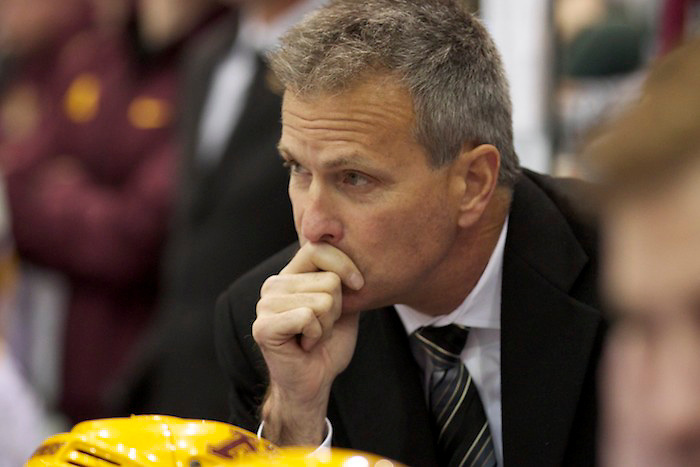
Unsurprisingly for someone who has coached for 30-plus years at three very different types of programs, Don Lucia has a lot of connections in the college hockey world.
Those connections were on display Wednesday when the newly-(re)formed CCHA named Lucia as its first commissioner in advance of its debut season in 2021-22.”The seven institutions have great tradition in hockey,” Lucia said during the opening remarks of his introductory Zoom conference call.
The CCHA will feature Bemidji State, Bowling Green, Ferris State, Lake Superior State, Michigan Tech, Minnesota State, and Northern Michigan.
“That’s one of the great things about our sport,” Lucia said. “There’s only a handful of ‘BCS’ schools that play college hockey but the reality is, all the schools treat their hockey programs like they are BCS schools. It’s the No. 1 sport on campus, and that’s the case with the seven members of the CCHA.”
It seems clear that the new conference picked Lucia, 61, as their head in part because of his varied coaching experiences as well as his relationships and connections to different programs. Those that know Lucia only for his time behind the bench at Minnesota — the biggest of big-time hockey schools — might forget that Lucia got his start at Alaska Fairbanks in 1981, when the Nanooks were still in Division II. He also coached at Colorado College, a school with a lot of hockey tradition but is still a Division III school playing up for hockey.
During Wednesday’s call, Lucia specifically pointed out this diverse background, saying he’d coached at both the Division I and II levels and had coached in three different conferences. And, after stepping down from the Gophers bench, he also spent a little time in an administrative capacity with the Minnesota athletic department.
He also has existing relationships with all the head coaches in the league. Northern Michigan’s Grant Potulny played for him in the early 2000s while Minnesota State’s Mike Hastings was a Gopher assistant in 2008-09.
Lucia also joked that he tried to recruit Bemidji State’s Tom Serratore to Alaska in 1981 but he was rejected.
“I want to see all the schools be successful. The decisions I make are going to be for the good of the league,” Lucia said. “I’m here to represent all seven schools, and I hope to have strong relationships with everybody like I do with Grant and a few others.”
The most pressing issue for the new league, now that it has a commissioner, is how quickly it can expand. Although Lucia said a few times that seven teams is feasible, it’s clear that adding programs and getting to at least eight would be ideal for scheduling and stability purposes.
“I think it’s a priority,” Lucia said. “Seven teams can work, in the Big Ten there’s seven teams. There’s a lot of conferences, like Hockey East, that have an odd number of teams, but if we can get that eighth team that would be extremely important. But it has to be the right fit. There has to be a commitment to their hockey program, because that’s something that’s very evident with members of the CCHA.”
“Commitment to hockey” is a phrase Lucia brought up more than a few times when discussing the CCHA. The seven CCHA schools are leaving the WCHA precisely because they perceive the other three schools in the conference — Alaska, Alaska Anchorage and Alabama Huntsville — don’t seem to have the same commitment to hockey.
Both Alaska programs have been mired in that state’s budget crises while in Huntsville, it’s more dire — the program was actually dissolved until a last-minute GoFundMe campaign raised the necessary funds to save it for a year. It had been floated since the CCHA announced this winter that all three schools could possibly join the CCHA with the right level of institutional backing, but Lucia said it hasn’t been formally discussed and it would be up to the seven schools.
“I think that’s part of the reason why we saw this new CCHA form. Alaska, having been up here a lot the past couple years, they have some real financial issues from how much money is being appropriated to their institutions and enrollment numbers. They’re going to have to sort that out before there can be any more communication with that,” Lucia said. “We’re pretty satisfied with the seven members. As we move forward we’ll be cautious about the teams that we add, and any teams that we want to look to add have to have that institutional commitment, or it doesn’t work.
“One school that keeps coming up is St. Thomas, currently a Division III school that is attempting to reclassify to Division I. The Tommies would be a natural geographic fit and right now the NCAA is still considering if it will let them move directly to Division I. The NCAA on Wednesday said it hadn’t voted on St. Thomas’ fate but it would be receptive to a waiver should the Tommies submit one.Lucia also seemed receptive to the Tommies.
“They certainly would be a candidate. They have a rich radiation academically and athletically,” Lucia said. “If they do come through with that announcement, they’re going to be looking for a home and that’s certainly somebody that we’d have an interest in.”
Other schools have been mentioned, including the newly-formed Long Island University in New York as well as Arizona State. How would they fit in the Great Lakes-centric CCHA?
“You’d like to stay in your geographic footprint,” Lucia said. “But that’s a discussion for the athletic directors, coaches and presidents to have; what they want our league to look like long term.
“There are other questions the league has to answer when Lucia officially starts in the job July 1. The ongoing COVD-19 pandemic is one of them. Lucia was asked at one point about the viability of starting a new conference in the backdrop of a pandemic-caused recession.
“I understand the importance of trying to run a conference office as efficiently financially as we possibly can, and those are the discussions we’re going to have,” he said. “We have to do everything we can to be efficient but also make sure we’re providing the resources the teams need to have success moving forward. Now is the time to maybe look at things differently. Is there more help we can get from an individual campus in order to run the league office that’s more cost effective?”
Everything, he said, is on the table in terms of running things more efficiently. With no regular flights to Alaska on the table anymore, the major, immediate source of savings for the league will be travel. Refereeing was also discussed.
“Scheduling models will be important as we move forward,” Lucia said. “What we’re going to do in the future with referees. If we can be in a situation where we can have more of a consortium in the west. I’ll be reaching out to the other league commissioners.
“We’re going to have to watch closely over the upcoming season what impact COVID-19 is going to have on attendance and the college hockey season. We just don’t know yet but we better have plans in place when we start the season in 2021-22.”


